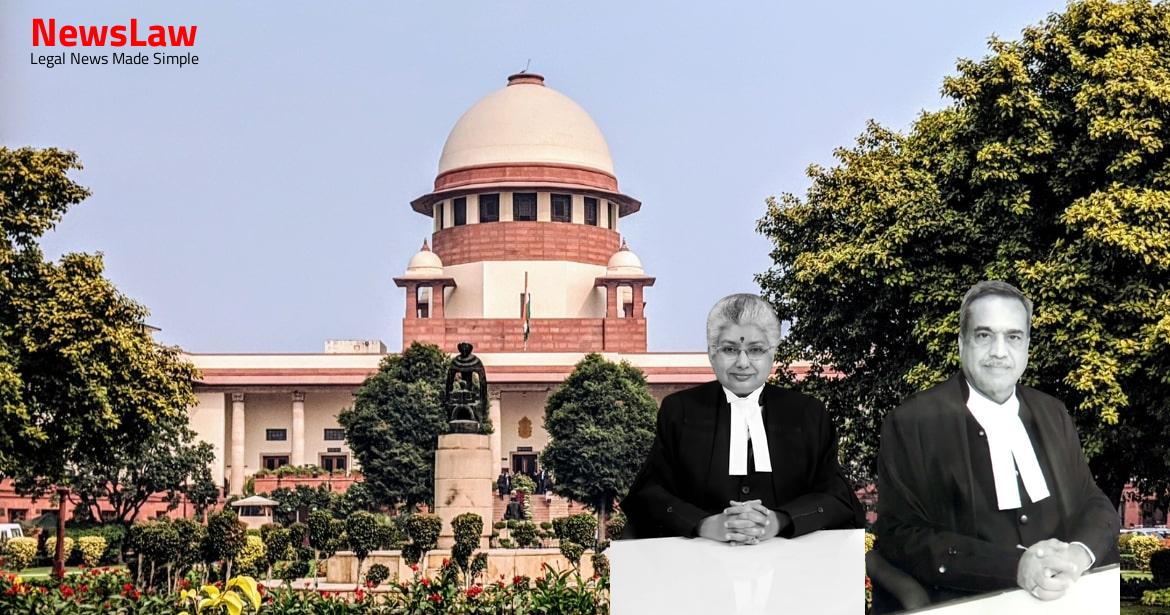The recent legal case delves into the court’s analysis of the Labour Court’s jurisdiction under Section 33(C)(2) of the Industrial Disputes Act. The core focus is on the interpretation of the law regarding adjudication of employer-employee relationships and claim entitlements. Understanding the nuances of this case is crucial for legal practitioners and stakeholders in the industrial sector. Stay tuned to unravel the complexities of court jurisdiction in labor disputes.
Facts
- Appellant is aggrieved by the High Court’s dismissal of the writ petition.
- Respondent No.2 filed an application under Section 33(C)(2) of the Industrial Disputes Act for wage difference.
- Appellant contested the application claiming no employer-employee relationship with respondent No.2.
- Appellant’s stand was that respondent No.2 was never engaged by them.
- Appellant challenged the Presiding Officer’s decision in a writ petition before the High Court.
- The appellant was directed to pay the difference of wages from 01.04.2006 to 31.03.2012 as claimed in the application.
- The order was dated 28.11.2017 by the learned Presiding Officer, Labour Court.
Also Read: Ruling on Circumstantial Evidence in Murder Case
Arguments
- Shri Yadav, representing the appellant, argues that the High Court should have set aside the order because the issue of employer-employee relationship between the appellant and respondent No.2 was seriously disputed.
- It is contended that the Labour Court should not have entertained the application under Section 33(C)(2) of the Industrial Disputes Act as the matter could have been resolved in the reference under Section 10 of the same Act.
- Citing cases like Municipal Corporation of Delhi Vs. Ganesh Razak and Union of India Vs. Kankuben, it is emphasized that in a proceeding under Section 33(C)(2) of the Industrial Disputes Act, the Labour Court cannot adjudicate the entitlement or basis of the claim; it can only interpret the award or settlement on which the claim is based.
- Based on the above submissions and case law, the appellant prays for the appeal to be allowed.
- The appellant is accused of fabricating a false case to avoid paying the difference in salary as claimed in the application.
- It is believed that the appellant used deception to shirk the responsibility of fulfilling the obligation.
- The court finds the appellant as having dishonest intentions to evade financial compensation.
Also Read: Challenging Legal Presumptions in Negotiable Instrument Cases
Analysis
- The appellant denied that respondent No.2 was ever engaged by them.
- The Labour Court should not have adjudicated on the employer-employee relationship if there was a dispute raised by the appellant.
- Labour Court’s jurisdiction is limited to interpreting the award or settlement, not deciding on the basis of the claim.
- Appellant disputed respondent No.2’s employment and the documents presented by respondent No.2 were challenged as forged.
- The High Court upheld the Labour Court’s decision, indicating that it did not exceed its jurisdiction.
- The Labour Court operates akin to an executing court under Section 33(C)(2) of the Industrial Disputes Act.
- In the case of Ganesh Razak and Anr. (supra), it was held that proceedings for computation of arrears of wages without prior adjudication of the disputed claim of the workmen are not maintainable under Section 33(C)(2) of the Industrial Disputes Act.
- As per the case of Kankuben (supra), a workman can approach the Labour Court under Section 33-C (2) of the ID Act if he is denied any pre-existing benefit or right.
- The benefit sought under Section 33-C (2) of the ID Act must be a pre-existing benefit or one flowing from a pre-existing right.
- It is crucial to distinguish between a pre-existing right or benefit and a right or benefit considered just and fair.
- Respondent No.2 is advised to seek other remedies available under the Industrial Disputes Act.
- Any future proceedings should be considered on their own merits and without being influenced by the current order.
- The court has not favored either party regarding the employer-employee relationship between the parties.
- The High Court failed to consider the scope and jurisdiction of the Labour Court under Section 33(C)(2) of the Industrial Disputes Act.
- The appeal has succeeded based on the above reasons and facts.
Also Read: Legal Analysis Critique in High Court’s Quashing Order
Decision
- The impugned judgment and order passed by the High Court and the order passed by the Labour Court under Section 33(C)(2) of the Industrial Disputes Act in Misc. Case No.26 of 2012 are quashed and set aside.
- No costs are awarded in this case.
- The present appeal is allowed with the above observations and to the extent mentioned.
Case Title: M/S BOMBAY CHEMICAL INDUSTRIES Vs. DEPUTY LABOUR COMMISSIONER (2022 INSC 152)
Case Number: C.A. No.-000813-000813 / 2022



